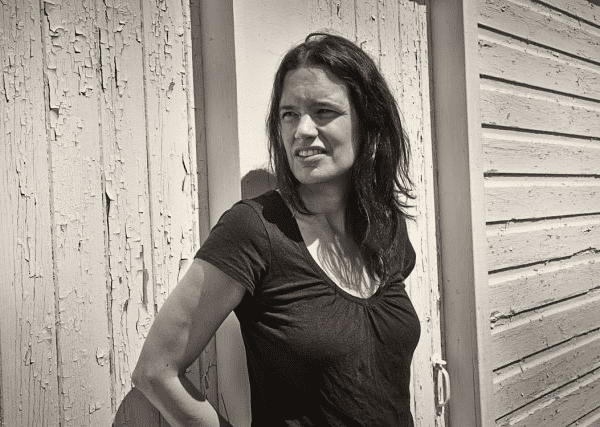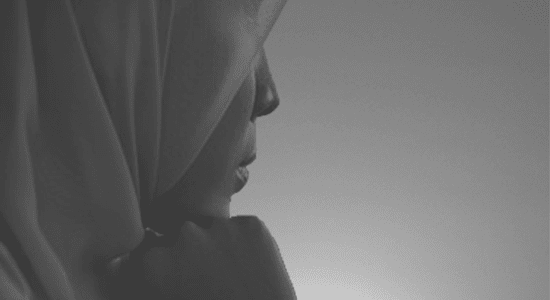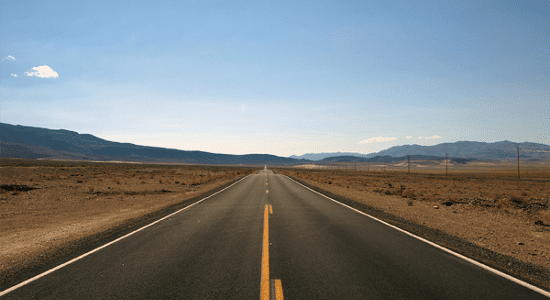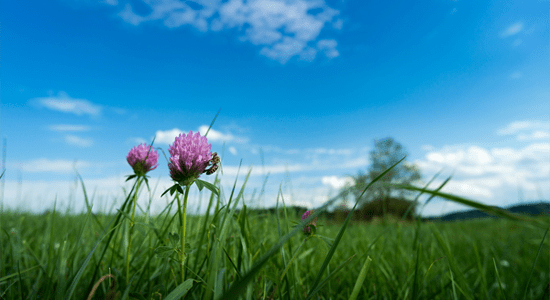A couple of years ago, I was at a talk by Monique Mojica, a Kuna and Rappahannock actor and playwright who had done a tremendous amount of work building the Indigenous theatre movement in Canada and the US. In this talk, she was talking about Kuna aesthetics and a Kuna editorial process based on the heart. I immediately identified with her teachings, and I started to think about the editing process differently. In Anishinaabeg, our word for heart is de. Our word for truth is debwe, and some of our Elders define truth as the sound of the heart. Monique talked about editing her play using the sound of her heart—to me, this has meant going through my work, line by line and making sure that it resonates with that part of me. Of course it is important to make sure that the story makes sense in all the other ways we usually edit, but for my work, using my heart to edit is also a very critical part of my process. I also usually ask my Indigenous women friends to do the same thing when they read my work, and this has proven to be the most lovely of processes.
March 2014
Author of the Month: Leanne Simpson
Tell us about yourself.
I am a writer, story-teller, educator and activist of Michi Saagiig Nishnaabeg ancestry and I live in Nogojiwanong (Peterborough, Ontario).
When did you realize you had a passion for writing?
Recently. I’ve written since I was a kid, but I don’t think anyone ever saw that in me and I didn’t see it in myself either.
What pieces of writing/authors have had the greatest impact on you?
Lee Maracle was the first Indigenous woman writer I ever read and her work still breaks my mind and my heart. Thomas King has also had a tremendous impact on me and many Indigenous writers of my generation. I love the work of Anishinaabe performance artist Rebecca Belmore, and dancers/choreographers Santee Smith and Rulan Tangen. They often embody in their work what I’m (trying) to write about. Anishinaabeg Elders Doug Williams and Edna Manitowabi are fantastic storytellers and have both been tremendous mentors and friends to me. The paintings of Robert Houle. Ellen Gabriel is just an incredible orator, and this is where our stories really live. I’ve also been recently blown away by a new generation of Indigenous playwrights—Waawaate Fobister, Cliff Cardinal and Renellta Arluk for instance. Ryan McMahon, an Anishinaabe comedian challenged me to go to some more difficult places in my work. The academic work of Dene scholar Glen Coulthard, Mohawk scholar Taiaiake Alfred and Andrea Smith has also really challenged and changed my thinking. Junot Diaz, Richard Van Camp and Denis Johnson all taught me about the short story. The poetry/lyrics of John K. Samson, Tara Williamson, Boots Riley, bell hooks, Shane Rhodes, and Jon Paul Fiorentino. And of course Zoe Whittall, and so many others.
How and when do you find time to write?
I don’t know. Left to my own devices, no matter what situation I find myself in, I always seem to find time to write, often to the detriment of a lot of other things.
What has been some of the biggest challenges you’ve faced as a writer?
It is a very difficult challenge for Indigenous writers and writers of colour to access our audience, particularly those of us that write for our own communities first. My audience doesn’t read Canadian literary magazines, attend writers festivals or go to fancy book launches. So one of the things Indigenous writers have to do, is to build our audience by taking our work to where our community is . . . this often means self publishing, blogging and launching our work at community events. This is actually really wonderful because in my experience, there is no greater feeling than writing something and having the people that mean the most to you in the world connect with it. I was extremely lucky to find Arbeiter Ring Publishing—a publisher dedicated to publishing work from the margins—without them, I’m not sure I would be a writer. And of course, this is starting to change with all these great new Indigenous publications like Kimiwan, Muskrat Magazine and As Us Literary Journal, and that’s a very amazing thing.
How have you changed as a writer over the years?
As I get older, I care a lot less what other people think and I am far more willing to be vulnerable, take risks and speak my truth. That is one of the truly fantastic gifts of age.
Strangers
Prelude
Toronto 2013
Mariam Ali found herself staring into the very eyes of hatred. They were a chilling and vibrant blue. A colour so crisp and cool, it reminded her of the fresh breeze that kissed her cheeks when she opened her window in the early hours of dawn. She marvelled at how a shade so cold, could burn like fire, almost as if it were searing her very skin. There she stood in the middle of an alleyway, held down against a metal fence by a man twice her size, wearing a ski mask. Yet here she was analyzing the colour of his eyes. It was absurd, almost comical really.
The grip he had on her throat tightened, and for a moment she thought perhaps he wanted to squeeze the life out of her, but all too quickly his hand relaxed and instead he lowered it to the lining of her headscarf. He toyed with it for a bit and then began tracing it till he reached the pin that was holding it all together.
She stiffened suddenly, and he smiled wolfishly at her reaction. It was a grin that lacked warmth, a baring of teeth to show that he was pleased in making her squirm. To her horror, she felt a burning sensation in her eyes and her vision grew blurry. “Don’t you dare cry,” she chided herself.
Leaning closer towards her ear, he whispered harshly. “Are you scared? ”
Mariam’s mind whirled, as she remembered the last time she was asked that question. It was from her Islamic teacher of seventeen years, Muftiyah Fatima Hassan. At the time, she could hardly answer her question through the blubbering of her tears, so her teacher took the liberty in answering for her.
“You cannot scare the one who fears Allah,” she said gently. “For when you shove a gun in their face, or hold a knife against their throat, they don’t see death. They see Paradise that will relieve them of their temporary Hell.”
At the time, her words held no meaning for Mariam, and the confusion she felt seemed to only make her cry harder. Even now, as she stood in the very situation that Muftiyah Hassan had described, Mariam realized she was scared. Her heart pounded thunderously against her chest as if it was knocking on the door of death itself. Her breathing grew shallow and rapid as her skin broke out into a sweat, that somehow made her feel hot and cold at the same time. The howling and screaming of her thoughts banged against the walls of her skull and yet she could produce no sound.
Scratch that. Mariam wasn’t scared. She was petrified. Terrified. Gripped by the icy realization that one brief instant could change her entire existence, granting her a one-way ticket to the land of the unknown. The land of the dead.
To where, she would meet her Maker.
“Allah,” she thought sadly. “Is it bad that I am scared? ”
For a moment she could only pity herself until suddenly it dawned on her.
“I am returning to my Maker,” she thought once more.
An abrupt wave of emotion washed over her, the strength of it making her gasp in shock. The tears that had clung to the surface of her eyes, no longer resisted and they streamed fiercely against her cold cheeks.
She was returning to her unseen friend, Allah. Her Al-Waddud—loving friend. Her Ar-Rahman—merciful friend. Her Al-Waliy—protecting friend. The only one who had stuck with her since the time of her birth. Mariam was surprised that this time, it wasn’t fear that she felt, but relief.
She could feel her lips stretch into an almost stupid like grin and suddenly she laughed.
“I must be crazy,” Mariam thought as she snickered. Who would laugh in a moment like this? The shock of impending death must induce insanity.
Although she couldn’t see his entire face, Mariam noticed the gaping of his mouth, in what only could be dumbfounded shock. It seemed to only make her laugh even more.
He still had a good grip on her and his hand returned to her throat as he slammed her into the fence. She winced as the jaggedly sharp fence, poked and prodded her back.
“Why are you laughing? HUH? ” her attacker shrieked. The blue fire in his eyes danced as they narrowed in anger, his lips pulling back into a snarl. “What the hell is so funny? ”
Mariam could hardly answer. She could still feel it, the magnitude of happiness. The sheer consciousness, and awareness of Allah’s presence. He was there and He would take care of her. Just like He always had. A feeling of love seized her heart so strongly, terrifying her, so much so that she trembled.
“You cannot scare the one who fears, Allah.”
For the first time in a long time, the void in Mariam’s heart ebbed away. The space was too full; crowded with emotions that she couldn’t even describe as the thunderous pounding of her heart slowed. Her tears disappeared as swiftly as they had come. She felt light, drunk on a sensation of freedom.
Her once slack spine suddenly straightened as she cleared her throat. Looking right into the eyes that had mesmerized her only moments ago, Mariam responded to her attacker’s initial question.
“Scared? Of you? Not in the slightest.” Her voice ringing clear and loud into the night air.
She was astonished at the vitality that came after feeling so fragile. It was a confidence that she never had felt the likes of before. There was no room for fear in her heart for man, when she was filled with love for her Lord.
“You cannot scare the one who fears, Allah.”
She felt it. Felt Him. Felt His Might and Strength, as her entire soul reached for it, clinging onto it desperately.
For the first time, since he had grabbed her, her assailant grew angry.
“You liar!” he snarled as he gripped her throat, slamming her once again into the metal fence. Her answer wasn’t what he expected. He wanted her to cower. To go on her knees and beg for life.
Instead, Mariam fixed him with a cool gaze of defiance.
He blinked for a few seconds, before removing one of his hands to reach for something in the giant pocket of his coat. Even in the dimly lit alleyway, Mariam recognized the distinct shape of a handgun. It was the first time she had ever saw one up close.
Pressing the cold muzzle against her abdomen, her attacker asked, “What about now? ”
Emerging Author of the Month: Hawa Yusuf
Tell us about yourself.
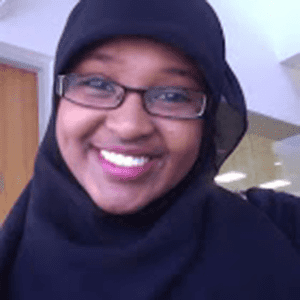
Not much to tell really. I am a 20-year-old journalism student at Centennial College and my hobbies include a lot of reading, writing and photography. Uh . . . and that’s me. (Sorry if this is so short, I am not really good with questions like this as you may already know.)
Tell us about the piece you’ve decided to share.
Well this piece is an excerpt from the novel I am working on called Strangers. The story takes a look at 17-year-old Mariam Ali, who was born and raised in Canada. At times though, Mariam feels like an alien in her own birthplace, not quite fitting in anywhere. Even though she is surrounded by such a culturally diverse society, Mariam believes that the idea of multiculturalism is a facade. A thing that first world countries boast about but truly never care for. She’d attended an Islamic private school all her life and is in for a major shock when her father tells her he can no longer afford to send her to private school. Suddenly she is thrust into the world of the Canadian, public high school system, where everything is different and she faces temptation, and adversaries around every corner. To make matters worse, she meets Grant Hughes, a notorious Islamophobe, who decides to make her life at her new school beyond unbearable.
The excerpt I decided to show is just of the prelude, where Mariam is attacked in an alleyway by a masked man.
When and why did you realize you had a passion for writing?
Growing up I had always liked writing. I mean English was by far my favorite class because it allowed us to be creative and asked our opinion on things and what not. It wasn’t however until the seventh grade that I realized how much I loved writing because we got this assignment one day that allowed us to write a short story and my reaction to it was pretty strange. I am pretty sure I squealed at the news. Never before was I ever that excited to do homework. That’s actually really geeky now that I think about. After some time now, I realized the primarily reason why I love to write is because it gives me (and this may sound cheesy) freedom. I have always felt limited because of someone else’s expectations of me, but not once did I ever feel limited when it came to writing. It was really liberating. Only when I picked up a pencil did I ever feel really content with myself. I could make the rules. I could make the story. It was all mine.
What pieces of writing/authors have had the greatest impact on you?
I’d have to be a fool not to say J.K. Rowling. Her books made me fall in love with reading at a young age. She made me realize just how powerful imagination is. I was enthralled by the words she uses, to the point where even now, I look back and think, wow was this really a children’s book? J.K. Rowling has this insane ability to literally make the story leap off the page, and it’s absolutely epic. It’s has made me really appreciate imagery as a tool. Lucy Maud Montgomery and Jane Austen are classic authors that I love because somehow they’ve made their stories timeless and I think a good story should be able to do that. Khaled Hosseini and Susan Abulhawa I admire because although their stories are fiction they open your eyes to an issue that someone is facing half-way across the world and I hope someday I can do that.
What kind of writer do you aspire to be?
I aspire to be the kind of writer that creates a home for someone. Naturally home is where you run to, because it’s safe and it gives you a bit of break. It’s the place where you can relax and be yourself. I think stories are temporary homes for us. It’s the place where people can relax and find relief from the hectic-ness that is their life. Growing up, books/stories were my catharsis and I hope someday my stories can be cathartic for someone else. Even if it’s just one person.
How and when do you find time to write?
I usually write in the evenings or late at night, because I have school before then. Weekends are the best time for me, because I wake up early and since I have nowhere to be, I immediately start writing. Sometimes I scribble some sentences into my notebook while I am on the subway to and from school and although not all of it is useful, I just like to know that I am still generating ideas and thoughts.
Édesapa
Driving down 48, Curious George’s gang sign tattooed on my right shoulder, your lips twitch to The Boss and I have lost my last quarter in the space between the seats. I still haven’t washed the paprikash smell from my ponytail. You are the man in the yellow bike shorts and I swallowed three puzzle pieces last night. We’re going down to the river. Your hands strum the heartland rhythm on a J-200 steering wheel. All I want for Canada Day is some discussion of Kafka and your cufflinks tucked away. There is a package wrapped in kraft paper on our doorstep— some undigested jigsaw we don't need. I’ve already seen the picture: two Telekis in a Jungleland stamping vermiculate patterns into Haliburton.
Untitled
Bittersweet mornings tracing my father’s back howling in summer grasses


